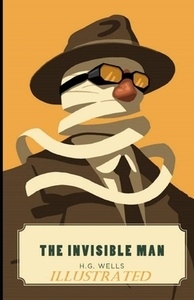Take a photo of a barcode or cover
dark
mysterious
medium-paced
Plot or Character Driven:
A mix
Strong character development:
No
Loveable characters:
No
Diverse cast of characters:
No
Flaws of characters a main focus:
Yes
i have been constantly conflicted with this book since i first started reading it...the start i absolutely adored. the wide range of characters and personalities really picked my interest, alongside the mystery of just *what* that man was doing in the room in the inn! once he did get discovered for being invisible (come on, don't come at me for spoilers - it's the title!) i liked it even more: the way the villages react, his desperation to survive, and how he treats the people he meets along the way thoroughly enjoyed me despite being quite cruel, to say the least. but once he meets up with a doctor (saving the name for the sake of spoilers to make myself look better for giving the invisible man away) i lost all interest. there were so many chapters of them just talking, and then the climax and finale were so rushed i felt very unsatisfied when i closed the book! if the ending had gone a different way i would have enjoyed this book much more. but otherwise, it was a good read! as all h.g. wells books that i've read so far, the language was incredibly easy to understand, and the plot could be something that you see in a modern science fiction book. a great one to get introduced to the classics/science fiction genre!
adventurous
mysterious
reflective
fast-paced
Plot or Character Driven:
Character
Strong character development:
Yes
Loveable characters:
No
Diverse cast of characters:
Yes
Flaws of characters a main focus:
Yes
dark
tense
medium-paced
Plot or Character Driven:
A mix
Strong character development:
No
Loveable characters:
No
Diverse cast of characters:
No
Flaws of characters a main focus:
Yes
“I’m an Invisible Man. It’s no foolishness, and no magic. I really am an Invisible Man.”
dark
mysterious
tense
medium-paced
Plot or Character Driven:
Character
Strong character development:
Yes
Loveable characters:
No
Diverse cast of characters:
No
There is a sweet little story behind me posting my review of this book for Goodreads now.
Last night I had the wonderful opportunity of attending the Classics and More Zoom Book Group. It was an invitation that was presented to me by GR friend, Christopher Cox who is a Librarian at the Mobile Public Library, and also leads this monthly group. Because I had reviewed A Painted House, https://www.goodreads.com/review/show/5739121195 he thought I might enjoy attending the group, and he was right. It was a wonderful discussion, and I am grateful for the experience.
Next month they will be discussing The Invisible Man.
As it so happens, I read this long ago, and yesterday, the very day of the discussion for A Painted House, the unabridged copy of The Invisible Man was donated to My Little Free Library Shed.
Serendipitous? Or just a nudge for me to post my review to Goodreads?
Now for anyone who has been reading my reviews, you know I am not a fan of science fiction. It is not my genre.
However…
This is H.G. Wells.
He was a classic, prolific writer. He was a fascinating man by nature.
Consider the books he has written – The Time Machine, The Island of Doctor Moreau, The War of the Worlds. He has always been a man before his time. His perception of being able to see things before it happened made him a visionary per se. So, in that sense, I couldn’t help but be interested in his futuristic approach to writing.
This novel was first published in 1897. It was considered one of the most famous scientific fantasies ever written. It was part of a series of pseudoscientific romances written by H.G. Wells early in his career, and it helped to establish him in the field of science fiction.
Our character is Griffin. A scientist who has discovered the means to make himself invisible. At first his “invisible” adventures are comedic and fun in his small village but then they turn rather terrorizing and cumbersome.
What will the villagers do?
When you consider Wells approach to the science of invisibility, it was interesting – he based his idea on our world as an illusion of light. That is a fascinating way of looking at the world. So perhaps, in this way, we can find a way to appreciate where his character is going with the idea of being “invisible.”
But…
It soon became kind of sinister, and there were some darker messages. So, were we supposed to like our main character Griffin – feel sorry for him – find him an anti-hero? Do we care what happens to him in the end?
And what is the true message of invisibility?
Can we find good for it? Or is it something that can be used for evil? What did Wells say it was only good for – murder?
Is there a moral message here?
This was a slow-moving story. Probably has a lot to do with the writing, itself. Not that the story wasn’t compelling, but that the style of writing was written in a different era – and storytelling styles were told differently then.
Still…
It is a classic. And H.G. Wells had a way of telling a story, and even though I don’t think it was his best story, it still was a fascinating read.
Last night I had the wonderful opportunity of attending the Classics and More Zoom Book Group. It was an invitation that was presented to me by GR friend, Christopher Cox who is a Librarian at the Mobile Public Library, and also leads this monthly group. Because I had reviewed A Painted House, https://www.goodreads.com/review/show/5739121195 he thought I might enjoy attending the group, and he was right. It was a wonderful discussion, and I am grateful for the experience.
Next month they will be discussing The Invisible Man.
As it so happens, I read this long ago, and yesterday, the very day of the discussion for A Painted House, the unabridged copy of The Invisible Man was donated to My Little Free Library Shed.
Serendipitous? Or just a nudge for me to post my review to Goodreads?
Now for anyone who has been reading my reviews, you know I am not a fan of science fiction. It is not my genre.
However…
This is H.G. Wells.
He was a classic, prolific writer. He was a fascinating man by nature.
Consider the books he has written – The Time Machine, The Island of Doctor Moreau, The War of the Worlds. He has always been a man before his time. His perception of being able to see things before it happened made him a visionary per se. So, in that sense, I couldn’t help but be interested in his futuristic approach to writing.
This novel was first published in 1897. It was considered one of the most famous scientific fantasies ever written. It was part of a series of pseudoscientific romances written by H.G. Wells early in his career, and it helped to establish him in the field of science fiction.
Our character is Griffin. A scientist who has discovered the means to make himself invisible. At first his “invisible” adventures are comedic and fun in his small village but then they turn rather terrorizing and cumbersome.
What will the villagers do?
When you consider Wells approach to the science of invisibility, it was interesting – he based his idea on our world as an illusion of light. That is a fascinating way of looking at the world. So perhaps, in this way, we can find a way to appreciate where his character is going with the idea of being “invisible.”
But…
It soon became kind of sinister, and there were some darker messages. So, were we supposed to like our main character Griffin – feel sorry for him – find him an anti-hero? Do we care what happens to him in the end?
And what is the true message of invisibility?
Can we find good for it? Or is it something that can be used for evil? What did Wells say it was only good for – murder?
Is there a moral message here?
This was a slow-moving story. Probably has a lot to do with the writing, itself. Not that the story wasn’t compelling, but that the style of writing was written in a different era – and storytelling styles were told differently then.
Still…
It is a classic. And H.G. Wells had a way of telling a story, and even though I don’t think it was his best story, it still was a fascinating read.
Catching up on classics. It's a good story that doesn't quite hold up today in parts (especially with an anti-Semite slur in one part despite being uttered by a character of low morals), but I feel it's important to have read and better understand the influence it has had.
"The Invisible Man" is a classic science fiction novel that explores the consequences of scientific experimentation and unchecked ambition. The story follows Griffin, a brilliant but morally ambiguous scientist who discovers the secret of invisibility. As he becomes invisible, Griffin descends into madness, consumed by power and isolation. Wells masterfully depicts the psychological and physical toll of invisibility, as Griffin grapples with the implications of his newfound ability. Through Griffin's journey, the novel delves into themes of identity, morality, and the dangers of unchecked scientific advancement. Wells' writing is both thought-provoking and suspenseful, keeping readers engaged as they ponder the ethical dilemmas presented. "The Invisible Man" remains a timeless masterpiece, challenging readers to contemplate the consequences of playing god and the true nature of humanity.
It wasn't what I expected, but I really enjoyed reading it. Althought it is not my favorite genre. It is a unique short science fiction. A story you will not forget easily.






